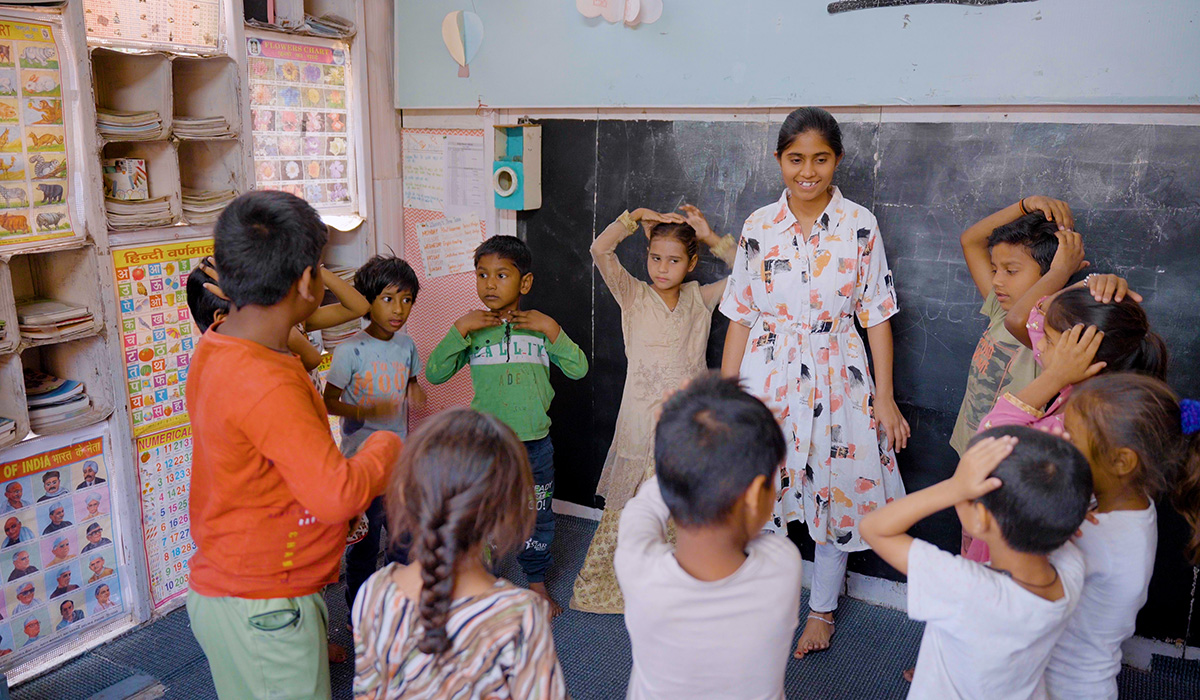This play is inspired by the real-life journey of Muskaan Ahirwar, a youth leader from the Durganagar slum in Bhopal, who received special mention at the Shikshagraha Awards 2025. At just 9 years old, Muskaan transformed a clothesline outside her home into a library for local children. Despite poverty and personal loss, she built Kitabi Masti, a thriving learning space now visited by over 100 children every day. Her story is one of courage, community spirit, and unshakable belief in the power of education—and shows how one determined girl can change the future of an entire neighbourhood.
Characters
MUSKAN – A determined young girl from the slums, 9 years old in Act I, 18 in Act III
MUSKAN’S FATHER MANOHAR AHIRWAR– A loving parent who believes in education
MUSKAN’S MOTHER MAYA AHIRWAR – Works as a housekeeper, educated till Grade 5
MUSKAN’S ELDER SISTER NEHA DIDI– Supportive sibling who completes college
AMITABH ANURAGI – Officer from Rajya Shiksha Kendra who mentors Muskan
PANKAJ BHAIYYA – Long-time volunteer and mentor
RAHUL BHAIYYA – Volunteer who helps with teaching students who visit the library
VAISHALI DIDI- Volunteer who teaches English
CHILDREN – Children from the neighbourhood (Palak, Naziya, Ashwini, Krishna, etc.)
NEIGHBOUR AUNTY – Representative of community skeptics
NEIGHBOUR UNCLE – Community member who supports the library
Act I: The Seed is Planted
Setting: A small slum area in Bhopal. Muskan’s modest home with a clothesline visible. January 2016.
Scene 1: Father’s Wisdom
(MUSKAN, 9, sits with her FATHER outside their small home. Children’s voices can be heard playing in the background.)
MANOHAR (MUSKAN’S FATHER): Beta Muskan, khel kud apni jagah hai, padhna bhi zaroori hai. (Playing is good, but education is important too.)
MUSKAN: But Papa, why only us four siblings? Don’t all children need to learn?
MANOHAR (MUSKAN’S FATHER): (smiling) You think about others even at such a young age. Yes, beta, all children should learn. Education is the only way out of this slum.
MUSKAN: Then why don’t all children here study properly?
MANOHAR (MUSKAN’S FATHER): That’s a good question. Maybe someday you’ll find the answer.
(MUSKAN looks thoughtfully at the other children playing)
Scene 2: KITABI MASTI: HOW IT STARTED
(Later that day. AMITABH ANURAGI and other officials from Rajya Shiksha Kendra (RSK) approach a street near Muskan’s home. A crowd gathers.)
AMITABH: We’re from Rajya Shiksha Kendra. Who studies best here? Who can read?
(Murmurs from the crowd. MUSKAN raises her hand confidently)
MUSKAN: Yes sir, I can read!
NEIGHBOR AUNTY: (worried) Muskan is very talkative. Someone will kidnap her someday! Why did you say this?
MUSKAN: (confused) All I said was that I can read.
AMITABH: (to Muskan) Can you show us? Read something for us.
(MUSKAN reads confidently from a Hindi book, then attempts some English)
AMITABH: (impressed) Very good! Would you like us to open a library for you?
MUSKAN: (not understanding but enthusiastic) Yes, sure!
AMITABH: We’ll bring lots of books. But you should also help others read.
MUSKAN: Theek hai Sir, padha lenge! (Okay sir, I’ll teach them!)
(AMITABH hands her a Bal Pustakalaya card)
Scene 3: The Beginning
(2016. MUSKAN hangs books on the clothesline outside her home)
MUSKAN: (to herself) If I hang these books here, maybe other children will get curious.
(Her ELDER SISTER NEHA DIDI approaches)
NEHA DIDI: What are you doing, Muskan?
MUSKAN: Starting a library! The sir from RSK said I should help others read too.
NEHA DIDI: (smiling) That’s a wonderful idea. I’ll help you.
(Children start gathering, looking curiously at the books)
KRISHNA: (a young boy) What are all these books?
MUSKAN: Come, I’ll read to you! Books have amazing stories.
(More children gather as MUSKAN begins reading aloud)
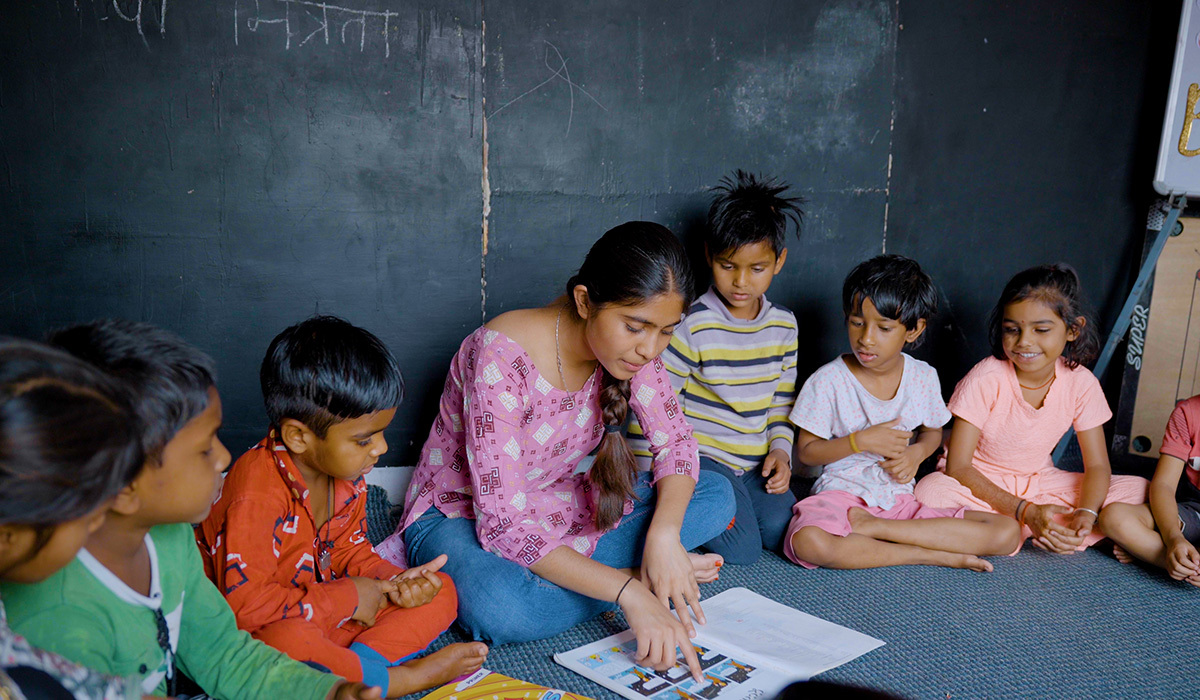
Act II: Growing Pains
Setting: Various locations – Muskan’s home, the chabootra (platform), the slum. 2017.
Scene 1: Challenges Mount
(MUSKAN teaches a group of children. It’s evening, and there are distractions – water delivery, goats wandering around)
NAZIYA: Muskan didi, I can’t concentrate. The aunties are talking so loudly.
KRISHNA: And look! The goat is eating our book!
MUSKAN: (rescuing the book from the goat) Don’t worry, we’ll find a better place. Learning is important, and we will not let any problems come in the way.
(PANKAJ THAKUR, a volunteer, approaches)
PANKAJ BHAIYYA: Muskan, I’ve been watching what you’re doing. I want to help. I’m Pankaj.
MUSKAN: (grateful) Really? We need help teaching the older children.
PANKAJ BHAIYYA: I’ll be here regularly. This work is too important to be done just by yourself.
Scene 2: The Chabootra
(They’ve moved to an open platform. Children sit in a circle. RAHUL MEHRA, another volunteer, has joined)
MUSKAN: This chabootra is only used during festivals. Rest of the year, it’s ours!
NAZIYA: It’s dirty, didi.
MUSKAN: Then we’ll clean it! (to her siblings) Come, let’s make this place beautiful for learning.
(They clean together. NEIGHBOR UNCLE approaches)
NEIGHBOR UNCLE: What are you children doing here?
MUSKAN: Uncle, we’re making a library. Children come here to read and learn.
NEIGHBOR UNCLE: (skeptical) This is Mataji ka pandal(a space for our Goddess). It’s for religious ceremonies.
MUSKAN: Uncle, if you believe in Mataji, then you know Saraswati Mata (the Goddess of learning in Indian culture) loves learning. This is for her too.
(NEIGHBOR UNCLE considers this, then nods approvingly)
Scene 3: The Tragedy
(MUSKAN sits alone, looking sad. Her MOTHER approaches, also looking distressed)
MOTHER: Beta, your father… he’s gone. The accident…
(MUSKAN breaks down. Children from the library approach hesitantly)
KRISHNA: Muskan didi, when will the library open again?
MUSKAN: (through tears) I… I don’t know.
(Muskan thinks to herself…My father wanted me to spread the message that education is important. He used to tell people how proud he was when I started the library. I must continue this work to keep his dream alive…)
MUSKAN: (remembering) He said I’d do well when I could improve others’ lives too.
(MUSKAN looks at the children’s hopeful faces, finds her determination)
MUSKAN: No. We won’t stop. Papa’s dream will live on.
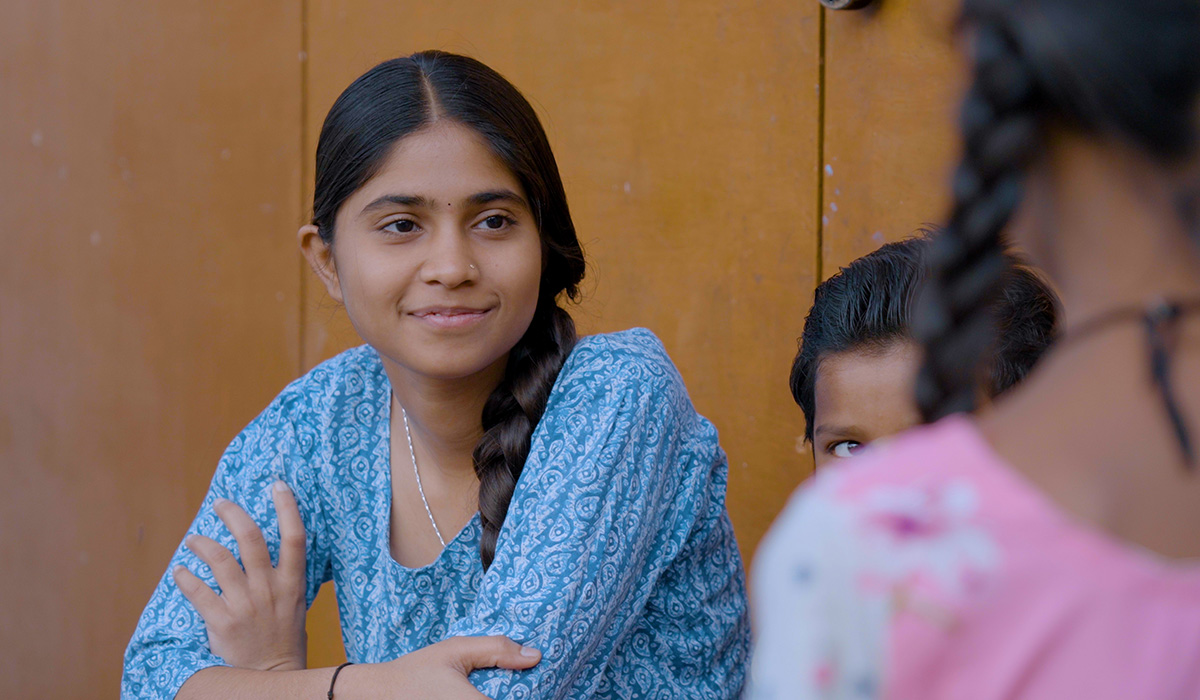
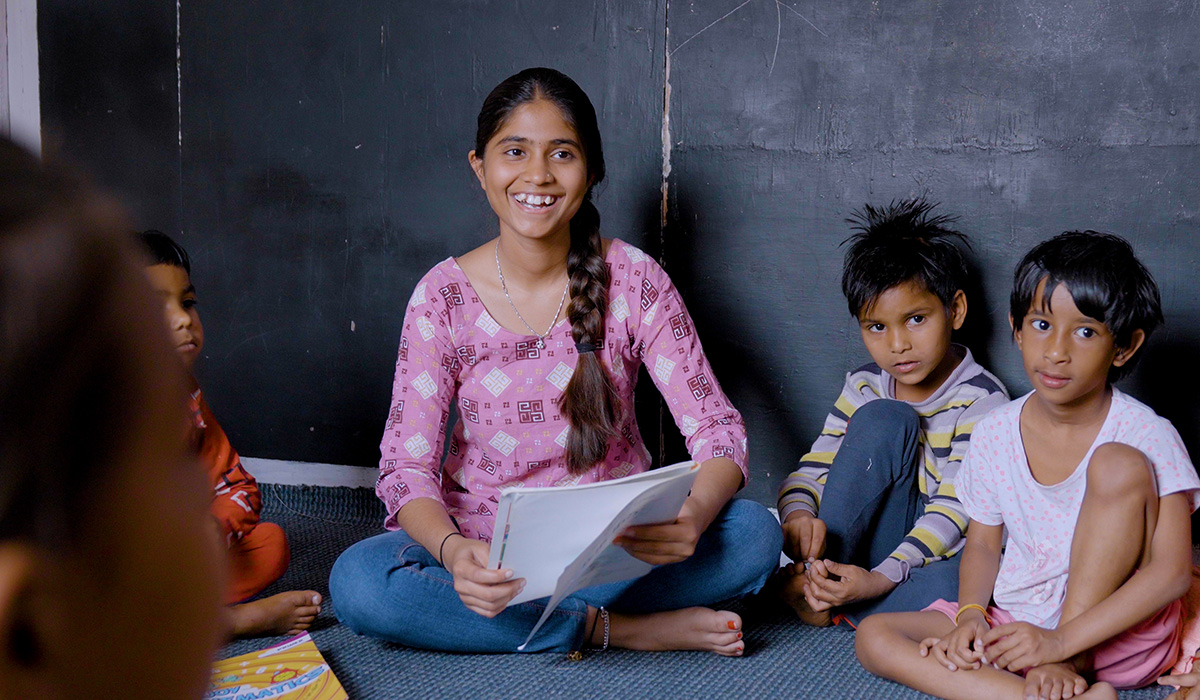
Act III: Full Bloom
Setting: The beautiful library structure. 2024. MUSKAN is now 18.
Scene 1: The New Library
(The library is bustling with activity. MUSKAN, now older, coordinates different groups. VAISHALI DIDI, a volunteer, teaches English in one corner)
VAISHALI DIDI: (to a group) Remember, practice makes perfect. Don’t be afraid to make mistakes in English.
(PANKAJ BHAIYYA works with older children on math)
PANKAJ BHAIYYA: If Muskan didi could build this library from nothing, you can solve this equation!
(MUSKAN addresses everyone)
MUSKAN: Remember, Kitabi Masti means having fun with books! We have 3,000 books now, from just 121 when we started.
KRISHNA: (now older) Didi, remember when goats used to eat our books?
(Everyone laughs)
MUSKAN: And now look at us! We have this beautiful building, wonderful volunteers, and most importantly – all of you learning and growing.
Scene 2: Teaching Beyond Books
(MUSKAN conducts a session on personal safety)
MUSKAN: Today we’ll talk about something very important – good touch and bad touch.
(She shows cards and shows the children a dice game she came up with to make the topic more engaging)
MUSKAN: This isn’t just for girls – boys need to know this too. Your comfort matters, even with relatives.
NAZIYA: (now a teenager) Before coming here, we never talked about these things.
MUSKAN: Knowledge protects us. We also talk about cleanliness, how to speak respectfully, and how to dream big.
(AMITABH ANURAGI visits)
AMITABH: Muskan, when I first met you as a little girl, I never imagined this would grow so big.
MUSKAN: Sir, you planted the seed. But it grew because of everyone’s support.
Scene 3: The Legacy
(MUSKAN speaks to the audience, with all characters gathered around)
MUSKAN: My mother now works two jobs to support us. My sister completed college and is preparing for civil services. My brothers are studying well.
NEHA DIDI: And early marriages have reduced in our community. Girls and boys both are studying now.
MAYA (MUSKAN’S MOTHER): (proudly) I may have studied only till Grade 5, but my children are showing the whole community the power of education.
PANKAJ: This library has changed not just the children, but the entire community’s mindset.
KRISHNA: (now a teenager) We know how to speak properly, how to dream of better futures.
PALAK: We teach the younger children now, just like Muskan didi taught us.
MUSKAN: (to the audience) From that day I hung books on our clothesline to now, we’ve learned that education isn’t just about books. It’s about believing that every child deserves a chance to dream and achieve.
(All the children cheer)
ALL CHILDREN: Kitabi Masti! Kitabi Masti!
MUSKAN: (final words) My father said I would do well when I could improve others’ lives. This library isn’t just mine – it belongs to every child who believes that learning can change everything.
(The sounds of children reading, laughing, and learning fill the air as the curtain falls)
Epilogue
(MUSKAN addresses the audience directly)
MUSKAN: Today, children from our slum know the difference between good and bad, they speak respectfully, they dream of becoming doctors, teachers, engineers, cricketers. Some are pursuing higher education in other towns and cities. Some teach the younger ones. The library continues to buzz with the sound of learning and laughter. When I was 9, I just wanted a place to read. Now, I know what I really built—a place to dream.
(She holds up a book)
MUSKAN: Every book here represents hope. Every child who reads represents change. And every day we’re open represents the power of believing that education can transform not just individual lives, but entire communities.
(Final tableau: All characters reading together as the lights dim)
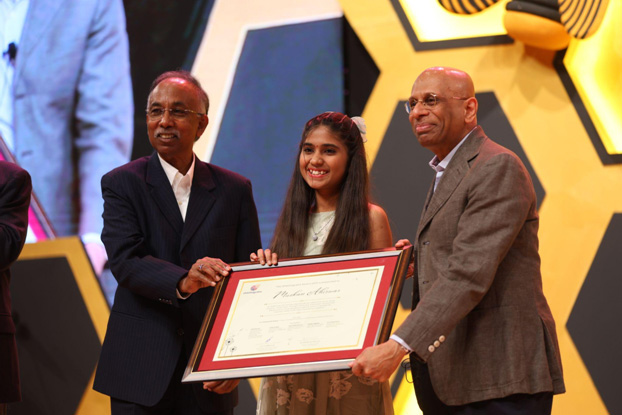
THE END
Author’s Note: Muskan’s Kitabi Masti library continues to serve children, proving that one person’s determination can indeed change the world. What began with a few books on a clothesline has grown into a sanctuary of learning, laughter, and limitless dreams for hundreds of children. Muskan’s journey reminds us that leadership doesn’t always come from positions of power—it can begin with a single act of courage in a corner of a slum. May her story inspire us all to believe in the transformative power of education, and to ask ourselves: What change can I spark, right where I am?

